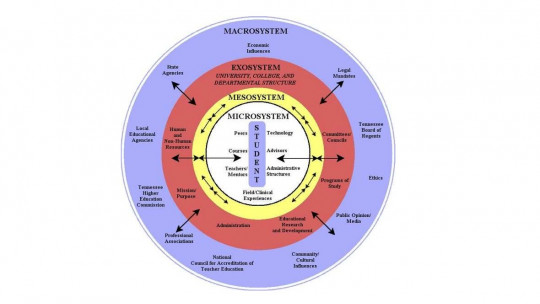
The ethics of care is a theory developed by the American psychologist Carol Gilligan as a moral theory about principles of a universal nature in human beings with respect to the ethics of justice.
The ethics of care by Gilligan and her collaborators aims to argue the right of people to care for others and the equality of moral and ethical development between men and women
This theory emerged as an alternative to Lawrence Kohlberg’s theory of moral development from the 1980s, which will be briefly explained in the following section to get into the subject.
At the same time, some arguments related to both theories will be presented, based on the impartial review of some bibliographic sources on models of moral development.
The Precedent of Kohlberg’s Theory of Moral Development
The psychologist Lawrence Kohlberg developed a model of moral reasoning that was divided into six stages and three different levels postulating that children reached higher moral levels as their cognitive capacity increased in relation to age and education.
The experiment that Kohlberg carried out to develop his theory arose from the analysis he carried out in his doctoral thesis on Jean Piaget’s theory of moral development. This experiment was based on the exposure of moral dilemmas to the participating subjects, having to choose between following the rules or disobeying them for the benefit of another person (for example, Heinz’s dilemma, which consists of posing a situation in which he must decide between stealing a medicine for a sick person, not being able to buy it, or respect the law and that person is left without the medicine they need).
The different levels of moral reasoning that Kholberg proposes when developing his theory will be briefly shown below.
Level I. Pre-conventional morality (4-10 years)
Here there is an individualistic perspective, based on a principle of hedonism Children are moved by their own interests.
Level II. Conventional morality (10-13 years)
Here The individualistic perspective of the previous stage begins to merge into a perspective more oriented toward the good of those closest to us, like friends and family. They worry about being “good kids” and pleasing other people.
Level III. Postconventional morality (adolescence-early adulthood)
The third level is that of authentic morality. Recognizes a conflict between two moral standards and reasons the decision to carry out one or another behavior based on the principles of justice and equality Likewise, this model was not free from criticism, as we will see below and, among which it is worth highlighting, the model that Gilligan postulates as an alternative.

- You may be interested: “Lawrence Kohlberg’s theory of moral development“
Carol Gilligan’s theory of care ethics represents a groundbreaking perspective in the field of moral psychology, challenging traditional notions of morality and emphasizing the importance of relationships, empathy, and compassion in ethical decision-making. In this exploration of Gilligan’s theory, we delve into its key principles, its significance in the context of moral development, and its implications for fostering a more caring and equitable society.
Gilligan’s ethics of care
The main criticisms made of Kohlberg’s model are mainly based on the fact that he did not carry out his research in real situations, but in an experimental context.
Another criticism of this study was that Kohlberg’s experiment could be biased, showing results in women with intermediate levels of moral development ; unlike men, who reached the maximum level of moral development in a large proportion.
It is as a result of these very controversial conclusions that Carol Gilligan, who was his student at Harvard University and a collaborator in his research, decided to develop her theory of care ethics, to the detriment of Kohlberg’s universalist theory.
So, Carol Gilligan’s ethics of care emerged as a counterpart to Kohlberg’s theory of moral reasoning which had investigated values that, Gilligan maintained, tended to be more important to men, such as following socially established norms and not harming others, leaving aside values such as the importance of caring for other people.
However, Gilligan’s research did not receive sufficient support at first and, therefore, he continued researching with the aim of obtaining greater solidity in his theory.
Gilligan wanted to investigate the way in which women made moral decisions when faced with different dilemmas In his research, situations were presented in which to act with morality, seeing this as a concept of responsibility in the face of selfishness, responsibility being understood as the obligation to care for other people and not cause harm.
After analyzing the results, Gilligan presented the conclusion that women focus less on abstract justice and fairness, and think more about the responsibilities they have towards specific people of your environment.
As a result of her research, she developed her theory of moral development in women, divided into 3 levels.
Level 1. Oriented towards personal survival (preconventional)
At this first level, women focus on themselves in what is best for them and in what serves them with some beneficial use.
Transition 1. From selfishness to responsibility
In this transition towards the conventional level, they begin to be more considerate of their relationships with others, being less individualistic.
Level 2. Kindness as a form of self-sacrifice (conventional)
In this conventional stage, is when they truly care about caring for others in a selfless way.
Transition 2. From goodness to truth
They make sure to weigh their decisions based on the consequences they could have They develop their moral reasoning to the point of always taking into account the needs of others, without ever losing sight of their own. They begin to find the balance between their self-care and the care of those close to them.
Level 3. Morality of non-violence (post-conventional)
It is the highest stage that can be reached at the level of moral reasoning, the post-conventional stage. By reaching this level they assume responsibility for their own decisions because they are in control of their lives It is the level where a moral balance has been consolidated between focusing on oneself and others.
- Related article: “What is prosocial behavior and how does it develop?“
Key Principles of Care Ethics
Gilligan’s theory of care ethics diverges from traditional moral theories, such as Kohlberg’s stages of moral development, by highlighting the centrality of relationships and the ethic of care in moral reasoning. Here are some key principles of care ethics:
- Focus on Relationships: Care ethics prioritizes the importance of relationships and interconnectedness, recognizing that moral decisions are shaped by our connections with others and our capacity for empathy and compassion.
- Ethic of Care: The ethic of care emphasizes the moral obligation to attend to the needs, well-being, and interests of others, particularly those who are vulnerable or marginalized.
- Contextual Understanding: Care ethics acknowledges the significance of context and situational factors in moral decision-making, recognizing that ethical dilemmas often arise in the context of specific relationships and social contexts.
- Emphasis on Empathy: Care ethics emphasizes the role of empathy and emotional responsiveness in moral reasoning, highlighting the importance of understanding and empathizing with the experiences and perspectives of others.
- Critique of Justice-Centered Approaches: Care ethics critiques traditional justice-centered approaches to morality, arguing that they may overlook the complexities of human relationships and fail to adequately address the needs of individuals.
Significance in Moral Development
Gilligan’s theory of care ethics offers a distinct perspective on moral development, particularly in relation to gender differences and socialization processes. She suggests that women tend to approach moral dilemmas from a care-based perspective, prioritizing relationships and empathy, while men may lean towards justice-centered reasoning. However, Gilligan emphasizes that these differences are not inherent to gender but are shaped by socialization and cultural norms.
In contrast to Kohlberg’s stages of moral development, which prioritize abstract reasoning and principles of justice, Gilligan argues that moral development should also include the cultivation of caring relationships, empathy, and compassion. She suggests that individuals progress through stages of moral development that reflect increasing awareness of the importance of care and relational ethics in moral decision-making.
Implications for Society
Gilligan’s theory of care ethics has profound implications for fostering a more caring, equitable, and compassionate society. By prioritizing the ethic of care in moral reasoning and social policy, we can:
- Promote Social Justice: Care ethics encourages attention to the needs and interests of marginalized and vulnerable individuals and communities, fostering greater equity and social justice.
- Enhance Relationships: Emphasizing the importance of relationships and empathy can strengthen interpersonal connections and foster a sense of community and mutual support.
- Inform Ethical Decision-Making: Care ethics provides a framework for ethical decision-making that takes into account the complexities of human relationships and the importance of empathy and compassion.
- Challenge Gender Stereotypes: By recognizing the diversity of moral perspectives and valuing care-based reasoning, care ethics challenges traditional gender stereotypes and promotes gender equity in moral discourse and practice.
Moral development according to Gilligan
For Gilligan, the greatest moral dilemma a woman had was based on the conflict he had between his needs and the care of other people
In her model, Gilligan postulates that women’s preferences toward caring for others as a moral responsibility are based on the fact that they are responsible, to a greater extent, for caring for newborns. The result of this is that female personality traits can be found in all societies and cultures that are more rooted in connection with other people than male personality traits usually are.
The fundamental characteristics that are extracted from Carol Gilligan’s theory of care ethics are: care, responsibility, community, attention and interdependence The force that moves them is mutual cooperation that is carried out through skills such as empathy and the ability to sustain interpersonal relationships. This is stated in contrast to the ethics of justice, whose values were more directed towards individuality, independence, objectivity, freedom, equality and justice, being driven by reason and compliance with stipulated norms.
Conclusions on Carol Gilligan’s theory of care ethics
In conclusion, it is worth noting that There is research carried out a posteriori that did not find large differences in terms of gender with respect to moral reasoning
113 studies were analyzed in this regard and they concluded that women thought more in terms related to care, on a contextual level; while men used to do it in terms associated with justice, located on a more formal and abstract level. Stating that the differences between both sexes were small.
Other studies using neuroimaging radiology techniques found that women had greater brain activity in areas that are associated with care-based reasoning (posterior, anterior cingulate, and anterior insula); while men had greater activity in other brain areas that are associated with justice-related processing (superior temporal sulcus).
In subsequent research, Gilligan postulates that the moral development of both women and men evolves beyond reasoning in abstract terms Therefore, in his research, he used moral dilemmas applied in real situations that could arise for the people evaluated at some point in their lives.
A striking result of the experiment by Gilligan and his colleagues was that they were able to observe that many twenty-somethings were dissatisfied with their capacity for moral logic, considering that it was underdeveloped and at the same time they had a superior capacity to live with moral contradictions.
On the other hand, it should be noted that Gilligan’s model has been widely accepted by the developmental psychology community as it is carried out in a real context, and also reflects an alternative system of values with respect to that proposed by Kohlberg. Likewise, it is notable that Kohlberg added a seventh stage to his model of moral reasoning and his model became more consistent with Gilligan’s model
The latest update of the Gilligan and Kohlberg models propose that responsibility towards other people is the maximum level that can be reached in the development of moral reasoning. Both psychologists agree on the fundamental importance of relationships with other people, as well as compassion and care for others, for both sexes.
Embracing the Ethics of Care
Carol Gilligan’s theory of care ethics offers a compelling alternative to traditional approaches to morality, emphasizing the importance of relationships, empathy, and compassion in ethical decision-making. By embracing the ethic of care, we can foster greater understanding, empathy, and solidarity in our interactions with others, and work towards building a more just, caring, and compassionate society.








